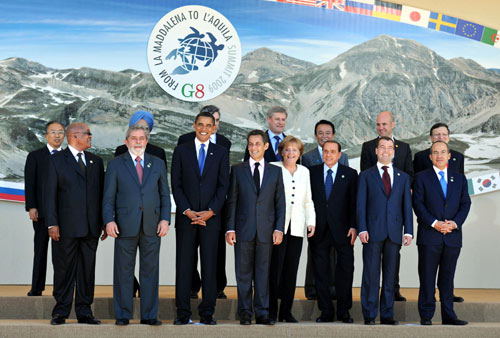Leaders of the Group of Eight (G8) industrialized countries and five major developing countries agreed?Thursday to reform financial institutions, boost development and conclude the Doha Round trade talks.
The leaders of G8 nations -- Germany, France, Italy, Britain, Japan, Russia, Canada and the United States -- and five major developing countries including India, China, Brazil, Mexico and South Africa plus Egypt reached consensus on concluding the Doha Round trade talks in 2010.
 |
|
Chinese State Councilor Dai Bingguo (1st L Back), on behalf of Chinese President Hu Jintao, poses for a family photo with leaders of the G8 countries and five other developing countries, in L'Aquila of Italy, July 9, 2009. |
President of the European Commission Jose Manuel Barroso, together with the leaders of Egypt and Sweden were also attended the meeting.
Chinese President Hu Jintao did not attend the meetings as he cut short his stay in Italy and returned to Beijing because of a riot broke out in Xinjiang Uyghur Autonomous Region. State Councilor Dai Bingguo took part in the meetings on his behalf.
The leaders discussed a global recovery agenda for balanced, inclusive and sustainable growth, said a joint declaration after their meeting.
They pledged to "foster a macro-environment that supports a robust and balanced resumption of domestic private spending to promote the revival of demand."
While continuing to support the recovery of the world economy, they would also begin to prepare exit strategies from the extraordinary policy measures taken to respond to the crisis, to be adopted once the recovery is assured and to ensure monetary and fiscal sustainability in the medium term.
"We will refrain from competitive devaluations of our currencies and promote a stable and well-functioning international monetary system," the declaration said.
Concerned by the high social costs of the crisis in terms of unemployment and poverty, they are committed to tackle the social dimension of the crisis, putting people's concerns first.
The leaders promised to continue reforming financial system regulation and supervision to prevent boom and bust cycles and they will work to ensure propriety, integrity and transparency of international economic and financial activity.
They would encourage and facilitate the development, dissemination and mutually agreed transfer of clean, low-carbon technologies, reducing carbon emissions and increasing energy efficiency from production to consumption, thereby improving energy security and access.
They "reconfirm our political will for reaching a comprehensive, fair, effective, agreed outcome, following the principle of common but differentiated responsibilities and respective capabilities at the UN Framework Convention on Climate Change Conference in Copenhagen in December."
They vowed to continue to reform the International Financial Institutions (IFIs) mandates, scope and governance, to enhance their relevance, effectiveness, and legitimacy and improve accountability and credibility and to give emerging and developing economies, including the poorest, greater voice and representation.
The leaders agreed to conclude the Doha Round in 2010.
"We, together with the leaders of Australia, Indonesia and Republic of Korea and in the presence of the director general of the World Trade Organization, are committed to seek an ambitious and balanced conclusion to the Doha Development Round in 2010, consistent with its mandate, building on the progress already made, including with regard to modalities," said a joint declaration after their meeting.
The leaders of the two groups pledged to achieve ambitious, balanced results and instruct their trade ministers to meet before the next Group of 20 industrial and developing nations in Pittsburgh in September.
"In order to fill in the remaining gaps in the negotiations as soon as possible, we instruct our ministers in charge of trade to explore immediately all possible avenues for direct engagement within the WTO and to meet prior to the Pittsburgh Summit," it said.
The Doha Development Round talks, which was launched in 2001 with the aim at helping poor countries through trade, should wrapped up years ago, but were delayed for several times because of rifts between developed and developing countries, mainly India and the United States over tariffs and agriculture subsidies.
On development, they pledged to set responsible policies for an inclusive and sustainable development, reaffirming their shared commitment to contribute to achieving the Millennium Development Goals (MDGs) through economic growth and support to peace and security, especially in Africa.
They were committed to mobilizing all resources for development, as we keep engaged to ensure the proper follow-up and implementation of the Monterrey Consensus and the Doha Declaration on Financing for Development.
"As part of these overall efforts, the G8 countries are committed to meet their ODA (official development aid) commitments, especially to sub-Saharan Africa, including those on Aid for Trade and debt relief."
They are committed to strengthening dialogue and partnership with low income countries on the basis of a set of core development principles, including promoting effective and responsible policies for sustainable development, promoting good governance, accountability and transparency.
The world leaders agreed to resist protectionism and foster a "genuine partnership" in the context of a strengthened multilateralism.
The leaders decided to change the Heiligendamm Process into the Heiligendamm-L'Aquila Process (HAP) to make it "a results-oriented process, focusing on global challenges of common and crucial interest to our countries."
They decided to continue their partnership over the next two years on an equal footing and would instruct the HAP Steering Committee to organize the necessary actions and to prepare a substantive report for the Muskoka Summit in 2010, "where we will review progress and provide guidance for the next steps of our common work."
The G8 summit in 2007 in Germany's Heiligendamm initiated the process with the five major developing countries to begin an equal and enduring partnership on key issues on the global agenda.
(Xinhua News Agency July 10, 2009)